The twice-named Robert Roberts is perhaps best known in the ragtime world for his clever and telling song I'm Certainly Living a Ragtime Life, written when ragtime was still rather new. By this time, however, he was hardly new to show business, or even that ragtime life he and the lyricist wrote about. Robert was born to Prussian immigrant and professional clown Nicholas D. Roberts and his French-born wife Augustine Claire Zahn. While his cemetery record and some traditional sources based upon it show an 1879 birth, virtually all other official demographic records indicate a drastically different year, showing him born in April of 1871. That his younger brother Nicholas Eugene was born on June 20, 1879, dismisses any possibility of Robert being born two months prior. Extant Cincinnati birth records date to 1873, and there is no World War I draft record for Robert, which helps to make the consistently cited 1871 date highly likely and 1879 incorrect.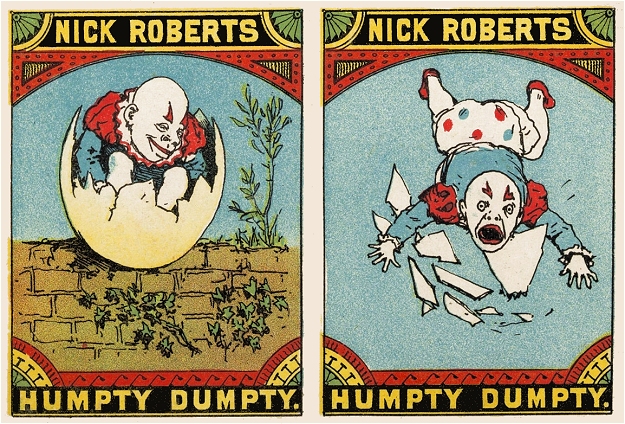 Also questioned in a couple of sources is the middle initial, with A shown in select instances. All of the official records cited above as well as copyright records that have a middle initial attached to them show it clearly to be S, although the name it is attached to was not found. Best guess based on demographics would be Stefan or Stephen. If it is ever located this essay will be updated.
Also questioned in a couple of sources is the middle initial, with A shown in select instances. All of the official records cited above as well as copyright records that have a middle initial attached to them show it clearly to be S, although the name it is attached to was not found. Best guess based on demographics would be Stefan or Stephen. If it is ever located this essay will be updated.
 Also questioned in a couple of sources is the middle initial, with A shown in select instances. All of the official records cited above as well as copyright records that have a middle initial attached to them show it clearly to be S, although the name it is attached to was not found. Best guess based on demographics would be Stefan or Stephen. If it is ever located this essay will be updated.
Also questioned in a couple of sources is the middle initial, with A shown in select instances. All of the official records cited above as well as copyright records that have a middle initial attached to them show it clearly to be S, although the name it is attached to was not found. Best guess based on demographics would be Stefan or Stephen. If it is ever located this essay will be updated.Nick Roberts, while classified often as a clown, was more what his contemporaries would have called a pantomimist, which society has now shortened to "mime" for brevity. Pantomime had been present in Europe for over two centuries, and had reportedly reached its pinnacle in Europe by the 1830s, according to an 1880 article in Gentleman's Magazine. However, having been introduced in the United States in the early 1830s, it had not done so well there, and was all but wiped out during the American Civil War. Nick, who had immigrated to the states after the war, was working to make it a respected art, albeit through the use of white-faced clowns. Shortly after the war ended, troupes started a resurgence of the art, often calling on children's stories from Mother Goose as their material.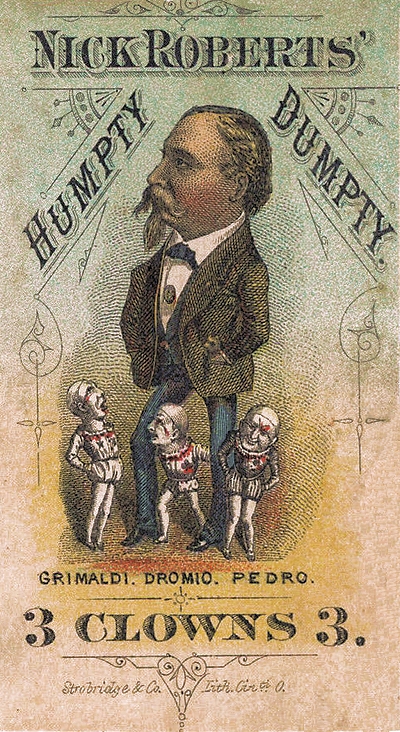 While most of the artists were French, Nick represented the Prussian point of view, and in the early 1870s took on the popular nursery rhyme Humpty Dumpty as the basis for the act he formed and managed, which had originated with G.L. Fox in the late 1860s. Several troupes were performing this pantomime in the 1870s, but Nick's seemed to stand out. There are some opinions that Robert traveled with his father, and may have been involved with stage work at some point, but that is hard to pin down. However, for the 1880 census taken in Richmond County, New York, some distance from their Cincinnati home, Amelia and Eugene were found at a boarding house while Nick and Robert were likely in transit or at a theater when the enumerators came by, indicating Robert's probable involvement by inference.
While most of the artists were French, Nick represented the Prussian point of view, and in the early 1870s took on the popular nursery rhyme Humpty Dumpty as the basis for the act he formed and managed, which had originated with G.L. Fox in the late 1860s. Several troupes were performing this pantomime in the 1870s, but Nick's seemed to stand out. There are some opinions that Robert traveled with his father, and may have been involved with stage work at some point, but that is hard to pin down. However, for the 1880 census taken in Richmond County, New York, some distance from their Cincinnati home, Amelia and Eugene were found at a boarding house while Nick and Robert were likely in transit or at a theater when the enumerators came by, indicating Robert's probable involvement by inference.
 While most of the artists were French, Nick represented the Prussian point of view, and in the early 1870s took on the popular nursery rhyme Humpty Dumpty as the basis for the act he formed and managed, which had originated with G.L. Fox in the late 1860s. Several troupes were performing this pantomime in the 1870s, but Nick's seemed to stand out. There are some opinions that Robert traveled with his father, and may have been involved with stage work at some point, but that is hard to pin down. However, for the 1880 census taken in Richmond County, New York, some distance from their Cincinnati home, Amelia and Eugene were found at a boarding house while Nick and Robert were likely in transit or at a theater when the enumerators came by, indicating Robert's probable involvement by inference.
While most of the artists were French, Nick represented the Prussian point of view, and in the early 1870s took on the popular nursery rhyme Humpty Dumpty as the basis for the act he formed and managed, which had originated with G.L. Fox in the late 1860s. Several troupes were performing this pantomime in the 1870s, but Nick's seemed to stand out. There are some opinions that Robert traveled with his father, and may have been involved with stage work at some point, but that is hard to pin down. However, for the 1880 census taken in Richmond County, New York, some distance from their Cincinnati home, Amelia and Eugene were found at a boarding house while Nick and Robert were likely in transit or at a theater when the enumerators came by, indicating Robert's probable involvement by inference.In 1876, Nick had expanded the act from one to two clowns on stage, and then in 1878, to three. He topped this in 1881, creating a small minstrel troupe, albeit with white faces instead of black. At one point, Nick reportedly had as many as forty performing artists on stage with his three clowns. The act, which had been launched at Tony Pastor's celebrated theater in New York City in October of 1881, remained popular throughout most of the 1880s, with performances seen advertised from California to Massachusetts. The relationship with his partners soured around 1887, forcing Nick to legally restrain them from involvement in the show, which he continued managing on his own. The nature of young Robert's involvement in the enterprise that his father managed remains vague to this day. He certainly learned some stagecraft and possibly gained his musical education during travel, but also likely derived benefit from the schools in Deutsch-centric city of Cincinnati, which had many fine musical institutes. However, he also did not follow his father into clown wrangling, perhaps because during this period the domain of the clown was shifting from the stage to the circus, where it would be most widely found in the 20th century.
It is possible that Robert, now going by Bob in the 1890s, had a more respectable career in mind. In the 1897 Cincinnati directory, he was shown working as a bookkeeper, possibly for his father.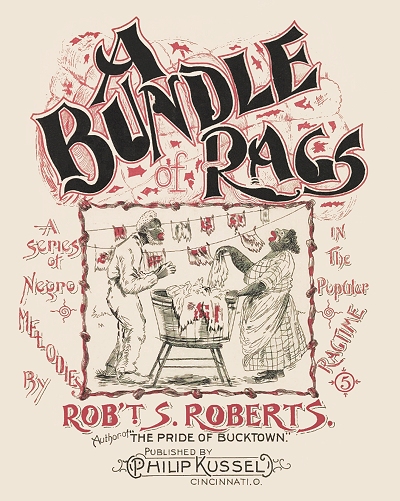 That same year, however, saw the publication of Bob's first two works, both of them instrumentals looking toward the new musical craze of ragtime. The Pride of Bucktown reads very much as a banjo cakewalk, while A Bundle of Rags does not belie its title, alternating between cakewalk strains and eccentric syncopations. According to historian Dave Jasen in his ragtime encyclopedia, Roberts was possibly a professional arranger in Cincinnati. Not much more was found concerning this aspect of Bob, including arrangement credits, so it is hard to confirm either way, but may have been possible. If so, the rags were competently notated, but not much more. Both were published in Cincinnati by Philip Kussel and saw good distribution in a time where published ragtime was still a rarity, but would not be for long. The 1898 directory was quiet on Robert's occupation, but in 1899 he was listed as a musician, having chosen a new career track.
That same year, however, saw the publication of Bob's first two works, both of them instrumentals looking toward the new musical craze of ragtime. The Pride of Bucktown reads very much as a banjo cakewalk, while A Bundle of Rags does not belie its title, alternating between cakewalk strains and eccentric syncopations. According to historian Dave Jasen in his ragtime encyclopedia, Roberts was possibly a professional arranger in Cincinnati. Not much more was found concerning this aspect of Bob, including arrangement credits, so it is hard to confirm either way, but may have been possible. If so, the rags were competently notated, but not much more. Both were published in Cincinnati by Philip Kussel and saw good distribution in a time where published ragtime was still a rarity, but would not be for long. The 1898 directory was quiet on Robert's occupation, but in 1899 he was listed as a musician, having chosen a new career track.
 That same year, however, saw the publication of Bob's first two works, both of them instrumentals looking toward the new musical craze of ragtime. The Pride of Bucktown reads very much as a banjo cakewalk, while A Bundle of Rags does not belie its title, alternating between cakewalk strains and eccentric syncopations. According to historian Dave Jasen in his ragtime encyclopedia, Roberts was possibly a professional arranger in Cincinnati. Not much more was found concerning this aspect of Bob, including arrangement credits, so it is hard to confirm either way, but may have been possible. If so, the rags were competently notated, but not much more. Both were published in Cincinnati by Philip Kussel and saw good distribution in a time where published ragtime was still a rarity, but would not be for long. The 1898 directory was quiet on Robert's occupation, but in 1899 he was listed as a musician, having chosen a new career track.
That same year, however, saw the publication of Bob's first two works, both of them instrumentals looking toward the new musical craze of ragtime. The Pride of Bucktown reads very much as a banjo cakewalk, while A Bundle of Rags does not belie its title, alternating between cakewalk strains and eccentric syncopations. According to historian Dave Jasen in his ragtime encyclopedia, Roberts was possibly a professional arranger in Cincinnati. Not much more was found concerning this aspect of Bob, including arrangement credits, so it is hard to confirm either way, but may have been possible. If so, the rags were competently notated, but not much more. Both were published in Cincinnati by Philip Kussel and saw good distribution in a time where published ragtime was still a rarity, but would not be for long. The 1898 directory was quiet on Robert's occupation, but in 1899 he was listed as a musician, having chosen a new career track.Robert was still living with his parents when the 1900 enumeration was taken in Cincinnati, listed as working in a music store, while Nick was still shown to be a theatrical agent. Eugene, who did not directly enter into the entertainment business, was employed as a printer at age 21. No stranger to travel or big cities, Robert appears to have ventured to New York City in 1900 with a couple of goals in mind. The first was realized when he co-wrote a song about the increasingly pervasive ragtime music with lyricist Raymond A. Browne, who at times used the pseudonym of Gene Jefferson, as in this case. The catchy tune, published in either Chicago or New York by Sol Bloom, seemed to capture the aspects of the lifestyle of those involved in ragtime,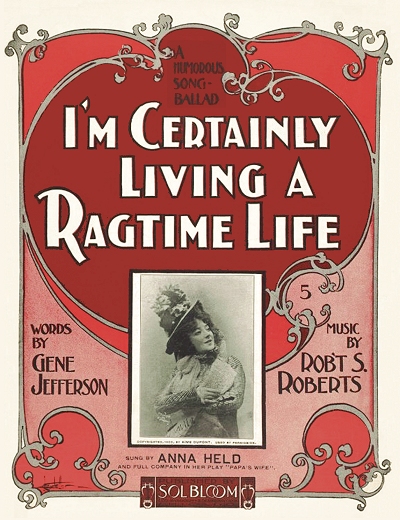 accurately predicting to some degree just how much it would consume the country over the next decade and a half, and even longer:
accurately predicting to some degree just how much it would consume the country over the next decade and a half, and even longer:
 accurately predicting to some degree just how much it would consume the country over the next decade and a half, and even longer:
accurately predicting to some degree just how much it would consume the country over the next decade and a half, and even longer:I got a ragtime dog and a ragtime cat,
A ragtime piano in my ragtime flat.
Wear ragtime clothes from hat to shoes.
I read a paper called the "Ragtime News."
Got ragtime habits and I talk that way,
I sleep in ragtime and I rag all day
Got ragtime troubles with my ragtime wife,
I’m certainly living a ragtime life.
Having the picture of entrepreneur Flo Ziegfeld's primary star and wife (at least in name), Anna Held, on some of the covers did not hurt sales of the piece. Others had singing soubrette Artie Hall below the title, and she would soon play a bigger role in his life. The New York Dramatic Mirror of August 18, 1900, claimed that Roberts "reports big financial returns from his song..." It also got him into a bit of a pickle once as noted in this July 18, 1900 mention in the New York Morning Telegraph, which has the marked appearance of a publicity plant.
Robert S. Roberts, a self-confessed song writer, came near involving himself in a large amount of trouble yesterday by trying to convince a police sergeant that one of his chansons was really worth singing. Owing to the interference of a kind hearted policeman, however, Roberts was permitted to go with a warning.
William Montgomery, a fourteen-year-old boy, had been arrested in West 125th street for disorderly conduct. When he was taken to the station he at first answered that "any old age" would do for him, and as to his address he replied: "Don't let that bother you. The Waldorf-Astoria will do." Policeman Dudley explained to the sergeant that the boy was singing an obnoxious song, entitled "I'm Certainly Living a Ragtime Life," and when he told him to move on, the boy jocosely said: "Ask me." "I did ask him several times," Dudley explained, "but he continued to sing and was drawing a crowd around him."
The sergeant was just about to send the boy to a cell when Mr. Roberts put in his appearance. He declared the boy was not singing, just warbling, and that the crowd was attracted by the workmen on the street railway tracks. "What interest have you in the matter?" the sergeant asked. "None," answered Roberts, "but I wrote the song." "You ought to be arrested as an accomplice," the sergeant said, "but as the policeman is willing to withdraw his charge I'll let you go this time. You ought to be ashamed of yourself for writing such stuff. I'll let you off this time, but don't do it again," and, turning to the boy, the sergeant concluded: "If this man ever tries to teach you another song let me know."
While the tune had good publicity such as that, it was perhaps just a moderate hit when it came out. Living a Ragtime Life was resurrected just over six decades later by performer Max Morath for a stage show sharing the same name as the tune. Yet another half-century has passed since that time, and the piece is still viable well into the 21st century as a sort of comic anthem of the early years of ragtime music.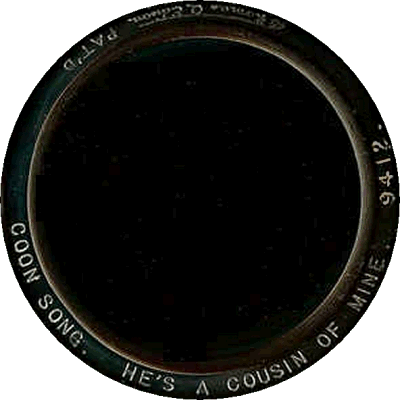 He followed up with a composition explicitly written for songstress Artie Hall titled My Genuine Georgia Gal, highlighting the crux of her act as a Southern singer. But it is not what Roberts' most lasting legacy would be. He arrived at the right time with the right talent, involved with the growing intersection of technology and entertainment that included audio recording and catchy new tunes designed to excite the modern consumer.
He followed up with a composition explicitly written for songstress Artie Hall titled My Genuine Georgia Gal, highlighting the crux of her act as a Southern singer. But it is not what Roberts' most lasting legacy would be. He arrived at the right time with the right talent, involved with the growing intersection of technology and entertainment that included audio recording and catchy new tunes designed to excite the modern consumer.
 He followed up with a composition explicitly written for songstress Artie Hall titled My Genuine Georgia Gal, highlighting the crux of her act as a Southern singer. But it is not what Roberts' most lasting legacy would be. He arrived at the right time with the right talent, involved with the growing intersection of technology and entertainment that included audio recording and catchy new tunes designed to excite the modern consumer.
He followed up with a composition explicitly written for songstress Artie Hall titled My Genuine Georgia Gal, highlighting the crux of her act as a Southern singer. But it is not what Roberts' most lasting legacy would be. He arrived at the right time with the right talent, involved with the growing intersection of technology and entertainment that included audio recording and catchy new tunes designed to excite the modern consumer.In the early days of cylinder recording a method had not yet been devised to mass produce them. So an artist or orchestra often spent a full day performing the same piece repeatedly into a number of recording horns that may make from eight to twelve copies at a time. Once those recordings, sometimes produced in batches of around 250 units, were sold out of inventory, some companies endeavored to recreate them if they were good sellers. This was how Bob got introduced to the Columbia Recording Company in late 1900 or early 1901. On his first dates with Columbia, he and singer Len Spencer set to recreating some tracks done by Arthur Collins and banjoist Vess Ossman a year or two prior, with Ossman back on his instrument. He also recreated some Collins recordings on cylinder. This became essential once Columbia added discs to their lineup in early 1902, wishing to put the same tracks on the newer format. Some sources claim that Roberts did not start recording until 1902, but some logs and matrix numbers indicate otherwise. He likely did more than the handful listed in the Columbia Cylinder and Disc lists to the left, but those are the known quantities. In 1901 and 1902, Bob returned to New York to cut a few more tracks, both on cylinder and disc.
For a time, especially at the bulk of his recording years from 1900 to 1910, it appears that Bob either moved to New York City, or perhaps just spent extended periods there while maintaining his Cincinnati residence.
His name did disappear from Cincinnati directories during the period from 1904-1908. A 1900 mention in the Sunday Telegraph noted he had moved from Yonkers to Brooklyn, then Manhattan, after abandoning the idea of a permanent residence in the other boroughs, and despite his Ohio appearance in the enumeration. A notice in in the New York Dramatic Mirror of February 23, 1901, noted that he was appointed a representative of publishing firm Whitney Warner (misspelled as Warren in the paper) of Detroit, which would soon become Jerome H. Remick's company. Evidently while touring in April of 1901 with Artie Hall, with whom he was romantically involved, Roberts was stabbed in a Buffalo, New York hotel room by showman/bartender (reports varied) Hal Hall and seriously wounded, even though he was able to push Hall down a flight of stairs despite the injury. It turns out that Hal was the alleged former husband of Artie, but she claimed she had divorced him five years prior, despite Hal claiming no such filing had transpired.
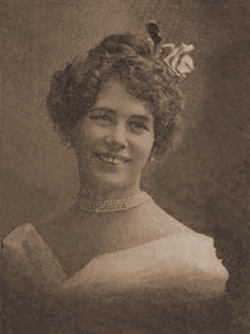 |
After Bob recovered, he went back into the studios for more recording. Some notices in Variety and other vaudeville papers showed that he was, at least briefly, a member of the Acorn Quartet, part of the Order of the Acorns, around 1903, along with William C. Kreusch, John J. Nestor and William Rodmond. In mid-1904 he was part of the show Louisiana, which was staged in the Delmar Garden theater just outside the main gate of the Lewis and Clark Exposition, known more commonly as the Saint Louis World's Fair. In 1906, he was part of the Big City Quartet, also composed of singers Robert J. Webb, Geoffrey O'Hara and Edward S. Metcalfe, performing now and then at midtown Manhattan venues.
Otherwise, Roberts was still working sometimes as a pianist in theaters and music venues of Cincinnati, as evidenced by the occasional newspaper mentions and directory listings, but also spending considerable time in New York City on the vaudeville stage, noted as one of the finest "coon singers" around. On the side, he still dabbled in composing, having some of his works written with various colleagues published by the firm of Howley, Haviland and Dresser.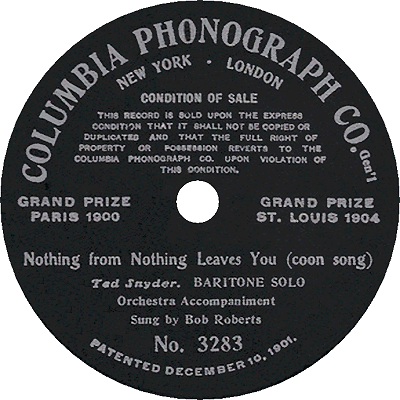 None of them were big hits, nor were any more instrumentals coming from his pen. It appears that Bob was spending longer periods of time on the East Coast starting around 1903, both in various recording studios and in performance venues. His forte seems to have been novelty or comedy songs, a genre that for most of the 1900s and 1910s was dominated by Billy Murray. However, both Roberts and Murray recorded together now and then. Another partner was Albert Campbell, with whom Bob recorded at least four comic monologues featuring characters Blitz and Blatz. But Roberts also knew how to turn a pretty tune, so he performed a number of ballads as well. On the promotional side, for his day job, he was seen as a representative as late as 1907 for publishing house Rose and Snyder, run largely by composer Ted Snyder.
None of them were big hits, nor were any more instrumentals coming from his pen. It appears that Bob was spending longer periods of time on the East Coast starting around 1903, both in various recording studios and in performance venues. His forte seems to have been novelty or comedy songs, a genre that for most of the 1900s and 1910s was dominated by Billy Murray. However, both Roberts and Murray recorded together now and then. Another partner was Albert Campbell, with whom Bob recorded at least four comic monologues featuring characters Blitz and Blatz. But Roberts also knew how to turn a pretty tune, so he performed a number of ballads as well. On the promotional side, for his day job, he was seen as a representative as late as 1907 for publishing house Rose and Snyder, run largely by composer Ted Snyder.
 None of them were big hits, nor were any more instrumentals coming from his pen. It appears that Bob was spending longer periods of time on the East Coast starting around 1903, both in various recording studios and in performance venues. His forte seems to have been novelty or comedy songs, a genre that for most of the 1900s and 1910s was dominated by Billy Murray. However, both Roberts and Murray recorded together now and then. Another partner was Albert Campbell, with whom Bob recorded at least four comic monologues featuring characters Blitz and Blatz. But Roberts also knew how to turn a pretty tune, so he performed a number of ballads as well. On the promotional side, for his day job, he was seen as a representative as late as 1907 for publishing house Rose and Snyder, run largely by composer Ted Snyder.
None of them were big hits, nor were any more instrumentals coming from his pen. It appears that Bob was spending longer periods of time on the East Coast starting around 1903, both in various recording studios and in performance venues. His forte seems to have been novelty or comedy songs, a genre that for most of the 1900s and 1910s was dominated by Billy Murray. However, both Roberts and Murray recorded together now and then. Another partner was Albert Campbell, with whom Bob recorded at least four comic monologues featuring characters Blitz and Blatz. But Roberts also knew how to turn a pretty tune, so he performed a number of ballads as well. On the promotional side, for his day job, he was seen as a representative as late as 1907 for publishing house Rose and Snyder, run largely by composer Ted Snyder.Contracts were rare back in the early days of commercial recordings, so while artists may have been discouraged to some degree from working for other studios, that did not deter them. To that end, Bob and his colleagues often recorded the same piece for anywhere from two to five different companies, and on multiple formats, be they two-or-four-minute cylinders, laterally-cut discs, or vertically-cut discs.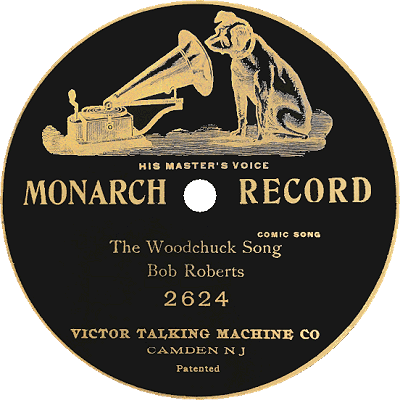 As with other artists in his genre, Bob was found on the two major companies, Columbia in New York and Victor in Philadelphia, as well as Edison cylinders and a few of their discs. Other recordings, not all of them made in New York City, were either cut by companies like Zonophone, Indestructible, U.S. Everlasting or Rex, or were simply repressed and distributed under lesser labels, many connected with department stores. Several of Bob's recordings became rather popular, including My Name is Morgan But it Ain't J.P., and the clever tongue twister Woodchuck Song (how much wood would a woodchuck chuck...). All told, Bob made over 400 known recorded sides (many of them duplications of songs) between 1900 and 1916, albeit with a bit of a drop-off from 1908 forward despite his continuing work on stage, both as a singer and now as a comic monologist, as he had done on some of the records.
As with other artists in his genre, Bob was found on the two major companies, Columbia in New York and Victor in Philadelphia, as well as Edison cylinders and a few of their discs. Other recordings, not all of them made in New York City, were either cut by companies like Zonophone, Indestructible, U.S. Everlasting or Rex, or were simply repressed and distributed under lesser labels, many connected with department stores. Several of Bob's recordings became rather popular, including My Name is Morgan But it Ain't J.P., and the clever tongue twister Woodchuck Song (how much wood would a woodchuck chuck...). All told, Bob made over 400 known recorded sides (many of them duplications of songs) between 1900 and 1916, albeit with a bit of a drop-off from 1908 forward despite his continuing work on stage, both as a singer and now as a comic monologist, as he had done on some of the records.
 As with other artists in his genre, Bob was found on the two major companies, Columbia in New York and Victor in Philadelphia, as well as Edison cylinders and a few of their discs. Other recordings, not all of them made in New York City, were either cut by companies like Zonophone, Indestructible, U.S. Everlasting or Rex, or were simply repressed and distributed under lesser labels, many connected with department stores. Several of Bob's recordings became rather popular, including My Name is Morgan But it Ain't J.P., and the clever tongue twister Woodchuck Song (how much wood would a woodchuck chuck...). All told, Bob made over 400 known recorded sides (many of them duplications of songs) between 1900 and 1916, albeit with a bit of a drop-off from 1908 forward despite his continuing work on stage, both as a singer and now as a comic monologist, as he had done on some of the records.
As with other artists in his genre, Bob was found on the two major companies, Columbia in New York and Victor in Philadelphia, as well as Edison cylinders and a few of their discs. Other recordings, not all of them made in New York City, were either cut by companies like Zonophone, Indestructible, U.S. Everlasting or Rex, or were simply repressed and distributed under lesser labels, many connected with department stores. Several of Bob's recordings became rather popular, including My Name is Morgan But it Ain't J.P., and the clever tongue twister Woodchuck Song (how much wood would a woodchuck chuck...). All told, Bob made over 400 known recorded sides (many of them duplications of songs) between 1900 and 1916, albeit with a bit of a drop-off from 1908 forward despite his continuing work on stage, both as a singer and now as a comic monologist, as he had done on some of the records.The 1910 enumeration showed Roberts living in Manhattan, working as an artist in the theater, and indeed several notices in vaudeville papers confirmed him as being on the stage frequently on both coasts, so he was well-traveled. Also residing with him were his mother, who had been widowed by Nick a few years prior, and Eugene, who was working as a treasurer, likely for the same theater that Bob was frequently employed by. However, this appears to have changed at some point around 1910, and his stay there was transitory by the time of the census. Listings in 1909 and 1910 in Cincinnati showed Bob to be a theater stage manager. Although there were performance notices along the East Coast for him making appearances as late as 1911, he spent a great deal of time from then into 1915 on the West Coast, especially in Los Angeles theaters. During this period, he made his final set of recordings for Rex Records of Wilmington, Delaware. As these were vertically cut records as opposed to the more common laterally cut discs, it limited the market to only those who had compatible phonographs. According to several advertisements in Los Angeles papers from 1912 to 1915, Bob was clearly shifting from singer to monologist. He was advertised as the "Debonair Comedian" and even a "Beau Brummel."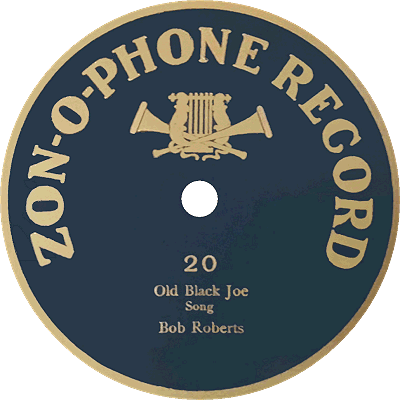 One advertisement indicated that he was "Late of the 'Follies of 1914.'" Which Follies is unclear, but it was likely not that of Florenz Ziegfeld. However, it appears that he moved back to Ohio during the mid-1910s. Little else was found on him following the cessation of his recording and stage activity in 1915 or 1916. By the late 1910s he had resurfaced in the family home at 3639 Archer, where they had been based since the late 1890s.
One advertisement indicated that he was "Late of the 'Follies of 1914.'" Which Follies is unclear, but it was likely not that of Florenz Ziegfeld. However, it appears that he moved back to Ohio during the mid-1910s. Little else was found on him following the cessation of his recording and stage activity in 1915 or 1916. By the late 1910s he had resurfaced in the family home at 3639 Archer, where they had been based since the late 1890s.
 One advertisement indicated that he was "Late of the 'Follies of 1914.'" Which Follies is unclear, but it was likely not that of Florenz Ziegfeld. However, it appears that he moved back to Ohio during the mid-1910s. Little else was found on him following the cessation of his recording and stage activity in 1915 or 1916. By the late 1910s he had resurfaced in the family home at 3639 Archer, where they had been based since the late 1890s.
One advertisement indicated that he was "Late of the 'Follies of 1914.'" Which Follies is unclear, but it was likely not that of Florenz Ziegfeld. However, it appears that he moved back to Ohio during the mid-1910s. Little else was found on him following the cessation of his recording and stage activity in 1915 or 1916. By the late 1910s he had resurfaced in the family home at 3639 Archer, where they had been based since the late 1890s.While it is possible that Bob had been both managing and performing on stages by the mid-1910s, now approaching his late forties he decided to leave this to the up and coming jazz and popular music artists of the next generation, and he settled into a new career. By the late 1910s he was managing a billiards parlor in downtown Cincinnati, which was eventually located on the second floor of the Hotel Havlin by the early 1920s. However, he also spent some time in the northern part of the state in Toledo, Ohio, although the reason is unclear. It was there that his mother Augustine passed away on on October 30, 1920. Around six weeks later, on December 14, Bob was married to Katherine A. De Vine of Toledo. Then they moved back down to Cincinnati where he settled into his management of the billiards parlor.
Directory listings confirm that Roberts continued with his pool hall into at least the mid-1920s. He either added another line of work or transitioned to it, as in 1927 he was shown to be a representative of the J.A. Stransky Mfg Co. of Pukwana, South Dakota, a manufacturer of an automobile carburetor attachment that allegedly doubled gasoline mileage through through pre-vaporizing the fuel. Stransky advertised heavily to secure selling agents around the country, and for at least part of a year, Roberts took the bait. The enterprise soon fell apart, leaving many agents stuck with inventory they could not sell. It is likely that Bob went back to focusing on his billiards. It is unclear if Bob Roberts, once a relatively well-known celebrity in the world of vaudeville and records, made any attempts at resurrecting his unique baritone voice during his last decade, having more or less faded into obscurity. However, according to a few notices in the Hamilton [Ohio] Evening Journal, he appears to have briefly performed for new radio station WCKY across the river in Covington, Kentucky in 1929, in a comic role for a show titled Adolph and Otto.
It was the night of January 20, 1930, when Bob went over to WCKY for an episode of Adolph and Otto, as virtually all radio was live in that time. He started complaining of chest pains, and was unable to give his scheduled performance. According to the Hamilton Evening Journal, "Roberts hurried to his home and took medicine, but a few minutes later his wife heard him fall over a chair." He died at home within a few hours of a heart attack at age 58. Robert S. Roberts was interred in a family plot Spring Grove Cemetery near his parents and recently-deceased brother Eugene. His wife Katherine would eventually join the group. It is unclear why cemetery records recorded Bob's year of birth as 1879, even as the newspapers reported his age as 54. Today Bob is known both for his fine recordings, two ragtime instrumentals, and that one song which echoed the dream of many a young buck in the early days of the 20th century, to be "Living a Ragtime Life."

 Compositions
Compositions  Recordings on Victor/Monarch
Recordings on Victor/Monarch